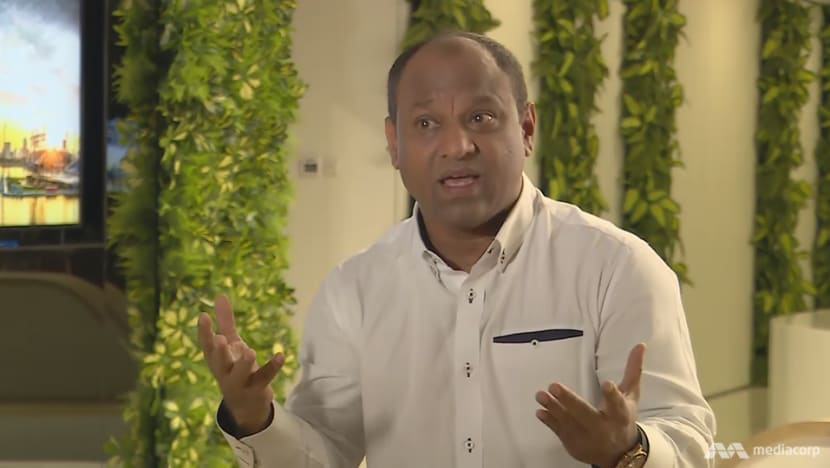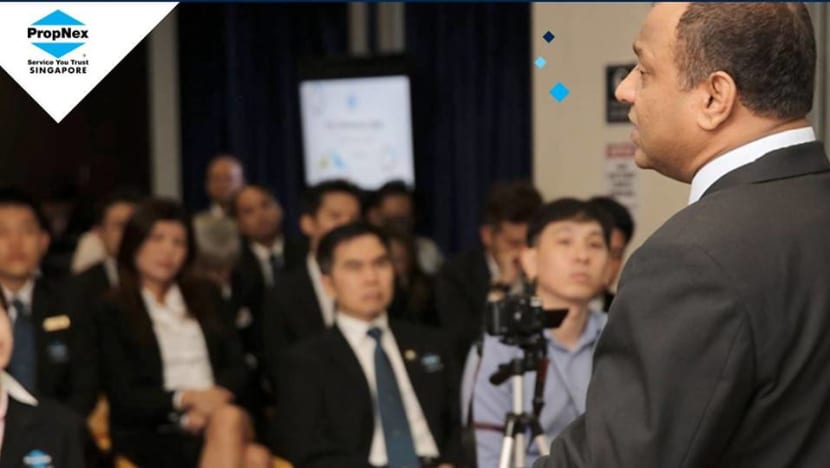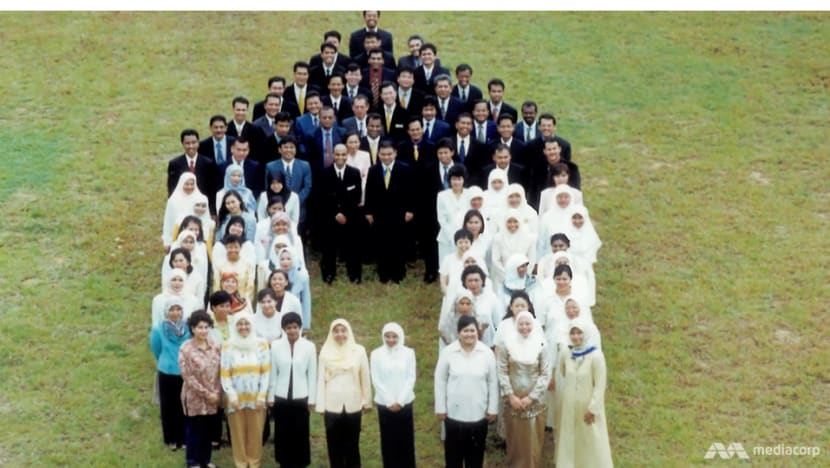From living in rental flat to running Singapore’s largest estate agency
Once a newspaper delivery boy, Ismail Gafoor became Propnex chief executive officer only with persistence and through many twists and turns on his journey to success.

The programme Money Mind finds out the turning points that changed Ismail Gafoor's life.
SINGAPORE: When he was 14 years old, Mohamed Ismail Gafoor faced a serious problem. Between him and his elder brother, only one could continue schooling, as the other was needed to work behind the cashier’s counter at their father’s provision shop.
Ismail knew he had to persuade his brother to let him continue studying. He understood that education would lead to a better life.
“I (told) my brother, ‘Hey, you’re one year older than me, and in all fairness, you should give me the opportunity.’ And I started to (use) all my negotiation skills,” he recounts.
I really felt sad for my brother because at the end of the day, he gave in.
Ismail wanted to go to university, but to his disappointment, he did not do well in his second language at O level. The now 56-year-old, however, did not get to be the man he is today without persistence.
He got a degree many years later — and the programme Money Mind follows him on the twists and turns of his journey, from humble beginnings to chief executive officer of Singapore’s largest real estate agency, Propnex Realty. (Watch the two episodes here and here.)

FROM NEWSPAPER BOY TO ARMY OFFICER
Ismail, one of six children — five boys and a girl — grew up in a one-room rental flat in Lengkok Bahru, where his father set up his shop.
After the latter also started a newsvendor’s business, the boys woke up early every day to help him, inserting the classifieds and making the deliveries — earning their family four cents per newspaper.
After school, the siblings helped out in the shop. “If I did the evening shift, then I’d probably … sleep by 10pm, 10.30pm, and the next day start at 4am,” recalls Ismail.
He knew at a young age that he did not want to follow in his father’s footsteps. When he enlisted into National Service, however, his education had already hit a wall.
But despite having only an O-level certificate, he was selected for Officer Cadet School as a top recruit. And he was “really happy” and “always smiling” in the army, where it was “much more comfortable” than his flat.
“We had our own beds. And beyond that, we didn’t need to wake up at four o’clock. The morning wake-up call was at 5.30am … We had good food. (It was) physically demanding, but I was physically fit,” he says.

He signed on as a regular in 1983 and rose up the ranks — around the same time he discovered the money-making potential of the property market.
“I used to take a bus together with my army buddy … Once, he told me his uncle had sold a property along Cavenagh Road and made a profit of about a quarter of a million dollars,” recounts Ismail.
To me, it sounded insane. In fact, it sounded sinful … I didn’t know how many millions of papers we needed to sell to earn S$250,000.
The more he passed by that road on the bus, the more determined he became to own enough properties to make a capital gain of S$1 million.
The idea that “if you want to be successful, maybe owning a property is the best way” was planted in his mind, and he harboured a desire to understand the market.
WATCH: Interview with Ismail Gafoor on the property market (5:28)
GIVING UP A MILLION-DOLLAR PENSION
His then girlfriend, now wife, was also in the army. And they went on dates to show flats at property launches as well as attended property seminars overseas. When they got married, their first home was a three-room resale flat.
But two years afterwards, Ismail was looking to buy their second home — at Normanton Park, whose flats were reserved for regular Singapore Armed Forces officers.
“We fell in love with one particular house so much that we … couldn’t even sleep that night because we really wanted to buy (it),” he recalls. “Eventually, we managed to negotiate a good price.”
The owner was none other than former Cabinet minister Lim Swee Say, who was then in the SAF.
There was just one hitch: To buy a Normanton Park apartment, officers had to have at least five years of service left. Ismail had only three, so he then negotiated a contract extension with his commander.
He just said, ‘Okay, I’ll approve your contract (extension) on condition that you must get your A levels by the end of the contract.' And I was happy about it.
It also paved the way for him to eventually get a bachelor’s degree in land economics from the University of Technology, Sydney.
But when he left the army at the age of 32 — giving up what could have been a million-dollar pension — he had not yet prepared for a second career. Three days later, he landed in hospital.
“I was in hospital for two days, and eventually it was clear that I was perfectly normal. It was just that maybe I was stressed,” he says.
So he and his wife “took a short break” in Malaysia to relax and figure out what he was going to do. "We decided that real estate should be the right career, as I was so passionate about it."
THEIR FIRST COMPANY
On Jan 1, 1996, six months after he left the army, the couple started the real estate company Nooris Consultants (coined using his wife’s name, Nooraini, and his). But they were novices in business, he admits.

“All the leadership and all the training in the army didn’t really prepare me … (for) my entrepreneurial journey,” he adds, citing the location of their office — at the former Apollo Centre in Havelock Road — as their first mistake.
No other salesperson wanted to join us … Parking was expensive, and there was no reason (for) people … to come to the Central Business District.
This, after the couple had spent S$20,000 on renovations. They found another tenant to take over their lease after six months and moved to Bukit Merah, which was then home to the Housing and Development Board’s headquarters.
Their second office cost another S$80,000, which was half their savings. But “it was all worth it”, Ismail says, “because the company’s DNA, in terms of putting things right, all took place here”.
It was where the two-man operation grew to 250 strong, after the couple noticed an unmet industry demand.
Many property agents could not pass the examinations for the now defunct Listed Housing Agents Scheme, the HDB’s preferred panel of agencies which enjoyed faster completion of transactions — so Nooris started conducting classes.
“I felt that I knew enough, and I helped so many people to pass their exam. And that’s how, naturally, people noticed that this couple were able to add value,” Ismail says.
Nooris became the largest Malay/Muslim real estate company within two years, with revenues of S$10 million. But he knew he had to look beyond this niche market, which was not only small but also mainly public housing.
“We wanted our salespeople to learn the skills of private property,” he explains.
A chance encounter with the founders of Prulink Realty then led to a partnership in 1999, known as First Class Consultants. And so began a series of partnerships, with Ismail now keen on establishing Singapore’s largest real estate agency.
NOT ABOUT ECONOMIES OF SCALE
Propnex, a network of real estate groups, was launched July 15, 2000. But Ismail soon learnt a thing or two about partnerships.

“We came together hinged on one idea, that is, economies of scale. I didn’t have the time, nor did we spend enough time, to understand the alignment of values among the five partners,” he says.
Within six months, there were cracks in the partnership, at a time when the market was not doing well and they had committed to a 10,000-square-foot office in Novena Square.
Two years on, the biggest firm in the partnership decided not to renew its franchise agreement with Propnex.
“I received a call from the press saying that one of my partners had released the information that they were severing ties … This was the first time I heard (of it). I was shocked,” he recounts.
I also accepted responsibility because the writing was on the wall: That things weren’t working … Things (were) crumbling under my feet. And I started to question my ability, my leadership.
He now understood, however, what Propnex needed to be: A merged entity with the same business principles. “It was no more about individual brands. It was about the bigger company, Propnex,” he adds.
“But … in the merger, we needed to have shares. And when we talk about shares, it can’t be equal shares. The four companies had different market shares, different profits.”
When he mooted the idea, the discussion got heated and some partners “slammed the table and walked out” on him in the boardroom. He gave them three months to think about the merger.
When they met again, the meeting started on a Saturday at 9am, “with different lawyers representing the different companies”, and the deal was inked at 4.30am on Sunday. The merger was announced June 15, 2004.
Propnex has since grown to over 7,500 agents, including in offices in Vietnam, Malaysia and Indonesia. Last year, it made its debut on the Singapore Exchange’s mainboard, and its market capitalisation is now about S$200 million.
READ: PropNex soars 22% on trading debut
Its annual conventions are on a large scale, and Ismail continues to believe strongly in recognising its top sales agents.

“From day one … we introduced — other than training — recognition systems and conventions,” he notes. “I carry a very simple philosophy … The day the company fails to add value to its people is the day people should leave.”
As for his journey to success, and the “joyous moments” in it, he says it is all about people.
“All my people grew together with us, strongly guided by the passion and the core values. And that’s something I feel so happy about,’ he adds.
Watch these episodes of Money Mind here and here. New episodes every Saturday at 10.30pm.


















